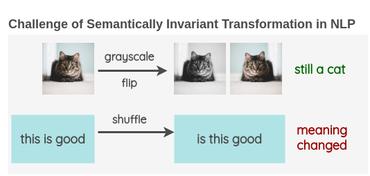Text Augmentation
33 papers with code • 0 benchmarks • 0 datasets
You can read these blog posts to get an overview of the approaches.
Benchmarks
These leaderboards are used to track progress in Text Augmentation
Libraries
Use these libraries to find Text Augmentation models and implementationsMost implemented papers
EDA: Easy Data Augmentation Techniques for Boosting Performance on Text Classification Tasks
We present EDA: easy data augmentation techniques for boosting performance on text classification tasks.
Contextual Augmentation: Data Augmentation by Words with Paradigmatic Relations
We stochastically replace words with other words that are predicted by a bi-directional language model at the word positions.
Data Augmentation via Dependency Tree Morphing for Low-Resource Languages
Neural NLP systems achieve high scores in the presence of sizable training dataset.
PairAug: What Can Augmented Image-Text Pairs Do for Radiology?
Acknowledging this limitation, our objective is to devise a framework capable of concurrently augmenting medical image and text data.
Learning to Compose Domain-Specific Transformations for Data Augmentation
Data augmentation is a ubiquitous technique for increasing the size of labeled training sets by leveraging task-specific data transformations that preserve class labels.
Sequence-to-Sequence Data Augmentation for Dialogue Language Understanding
In this paper, we study the problem of data augmentation for language understanding in task-oriented dialogue system.
Text Data Augmentation Made Simple By Leveraging NLP Cloud APIs
In practice, it is common to find oneself with far too little text data to train a deep neural network.
Improving short text classification through global augmentation methods
We study the effect of different approaches to text augmentation.
Empirical Study of Text Augmentation on Social Media Text in Vietnamese
Thus, when collecting the data about user comments on the social network, the data is usually skewed about one label, which leads the dataset to become imbalanced and deteriorate the model's ability.
Text Augmentation for Language Models in High Error Recognition Scenario
We examine the effect of data augmentation for training of language models for speech recognition.

